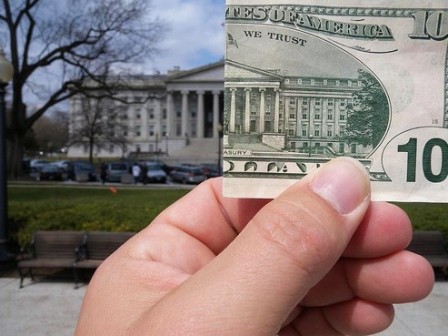
In 1969, American journalist Joe McGinnis published a book with the shocking title, “The Selling of the President,” which would become phenomenally successful. It described the “selling” of Republican candidate Richard Nixon and placed a finger on one of the most troubling distortions of American democracy. In 1998, Charles Lewis, founder of the Center for Public Integrity, went even further with “The Buying of Congress,” a book which denounces the detrimental influence that interest groups have on congressional members and senators.
Since then, nothing has really changed. Worse still, since a very controversial Supreme Court decision in 2010, both direct and indirect electoral spending has exploded. In 2012, Barack Obama and his Republican rival Mitt Romney each spent more than a billion dollars on their campaigns. According to The Washington Post, as of July 31 of this year Hillary Clinton had already amassed $700 million, while the billionaire Donald Trump had gathered close to $350 million.
Mass media, with the exception of high quality written press, speaks very little of this “money connection,” in part because they are among the principal beneficiaries of this manna which is primarily devoted to buying advertising space. They also speak little of it because the importance the candidates give to political advertising is also explained by the presumed ignorance of a vast portion of the public. An ignorance which is sustained by ratings-addicted audiovisual media who choose to distract public opinion as much as to inform it.
A Corrosive Effect
Certainly, electoral publicity is not a guarantee of success, as Jeb Bush bitterly observed when he was too quickly eliminated from the Republican primaries. But this reservation toward the efficacy of publicity cannot mask money’s corrosive effect on American electoral democracy.
It firstly acts as a “hiring filter,” to the extent that no candidate can seriously consider launching a presidential campaign without a richly endowed war chest at their disposal. Money then acts as a powerful instrument of influence on governmental policies. Even if decisions made by the White House or Congress don’t automatically reflect the interests of their sponsors, the favors given in return are an implicit part of the deal, a practice which grants excessive power to the richest or the best organized interest groups. In 2015, former Democratic President Jimmy Carter denounced the existence of an American “oligarchy” which he blames for the “complete subversion of our political system.”
This complicity, systematically documented by the Center for Responsive Politics, which was founded in 1988 by two senators — one Democrat and one Republican — in part fuels the populist wave that is now carrying Donald Trump. Engaged in a campaign against “the Washington elites,” the billionaire from New York has even persuaded some of his sponsors that his fortune, once he’s in power, would protect them against the interest groups seeking to “buy a president.” Hillary Clinton, for her part, is on the defensive. While traditionally the best financial backers, whose (poor) reputation is firmly established after the subprime crisis, and the oil industry primarily support the Republicans, she appears to be a candidate of the Establishment. Moreover, she’s been embarrassed by her Republican adversaries with accusations against the Clinton Foundation. At this point, nothing illegal has been established, but the risk for conflicts of interest has constantly lingered since she was secretary of state, which the Associated Press notes “fuels perceptions that giving the foundation money was a price of admission for face time with Clinton.”
Necessary Reforms
In fact, it is the whole of the American system, from research centers to organizations, that is marred by suspicion of being under the influence of elitist sponsors, whether they be big business, large fortunes or foreign states like Saudi Arabia. If a sizeable part of private funds supports projects favoring social justice, from racial equality to freedom, the campaign to recover cultural hegemony launched in the 1960s by conservative circles has largely succeeded. Conservative magnates like the Koch brothers, masterfully described by journalist Jane Mayer in her recent book “Dark Money,” have little by little imposed their agenda, not only within the Republican Party, but also within a significant part of public opinion, thus paving the way for Donald Trump.
“Government by organized money is just as dangerous as Government by organized mob,” President Franklin Roosevelt said during the 1930s, while his New Deal social reforms were sharply opposed by those he referred to as “plutocrats.” Will his warning end up being heard, to the point of leading to real reforms? Maybe. As journalist Bill Moyers recently wrote, “Most Americans agree that rich people should be able to buy more houses than anyone else, buy more cars… than anyone else — but they don’t think rich people should be able to buy more democracy.”

A democratic socialist America will not permit rich people even to buy more cars and houses than anybody else. A democratic socialist America will question and challenge the moral legitimacy even of ” legitimate ” wealth.
In just a few months the two party system in America has evolved into a one party system. Establishment USA supports Hillary Clinton.
Hillary says we are ” stronger together ” : working class America – betrayed by the Hillary Democrats – are stronger together with Wall St, the Pentagon, the CIA , the FBI, corrupt union leaders and the bought and sold mainstream news media( now daily demonizing Donald Trump ).
There is just enough class consciousness in America to just say NO to Harpy Hillary. In just a few months the Hillary Democrats have evolved into a cynical, sinister, neo-con War Party.
Vladimir Putin is right to see Hillary Clinton as the face of World War III. Yet , having sabotaged the presidential campaign of ” socialist ” Democrat Bernie Sanders, Hillary Clinton claims that Putin is the threat to the ” political process ” here.
We face a profound political crisis in the USA even after the 2016 presidential election. A crisis to shake the world.